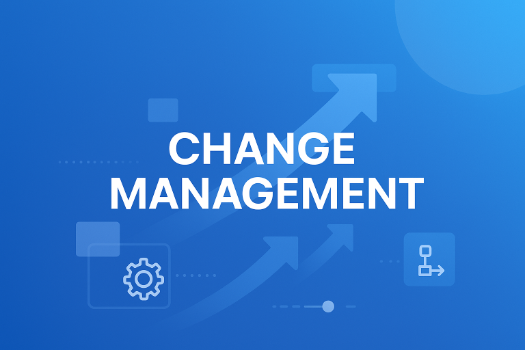Digital transformation is now inevitable in the corporate world. As companies accelerate their transformation journeys, SAP systems remain at the heart of business processes. Yet, constant change is intrinsic to this evolution: new modules, S/4HANA migrations, cloud architectures, integration projects, and regulatory pressures.
A study involving 200 SAP change managers from the UK, USA, and Germany revealed that 86% of participating organizations now see SAP change management as critical for competitive advantage. Furthermore, 48% of respondents reported significantly shorter delivery times from business request to execution. This pressure is reshaping the SAP manager’s role, requiring leadership in cross-team communication and active contribution to early-stage strategic planning.
Traditionally, large, long-term SAP projects (“monolithic” approaches) could keep pace with business demands. Today, this model is no longer effective. Changes are now implemented in smaller, agile, and business-value-focused increments, positioning SAP Basis teams at the center of change management.
Change Management from the SAP Basis Perspective
Historically, Basis specialists were responsible for system uptime, performance management, and technical operations. However, the accelerating pace of business and SAP’s next-generation solutions have fundamentally transformed this role.
Today, Basis professionals are not just “system administrators”; they have become:
- Guardians of business continuity
- Risk managers
- Strategic partners in change processes
In other words, SAP Basis teams are no longer merely IT support—they are central to the success of the business itself. This evolution requires them to possess not only technical expertise but also a deep understanding of business processes and the ability to anticipate potential challenges.

Key Factors Making Change Management Essential in SAP Environments
Several critical factors have made change management indispensable in SAP environments:
S/4HANA Migrations and System Architecture
S/4HANA migration goes far beyond a simple technical upgrade. It involves redesigning data structures, business processes, and system architecture. This complex transformation requires meticulous analysis of all dependencies and integration points. Without proper control, unmanaged changes can lead to process disruptions and data integrity issues.
Cloud and Hybrid Landscapes
SAP no longer operates solely on-premise. Private cloud, public cloud, and hybrid scenarios are increasingly common. The added complexity of these environments makes rigorous monitoring and control of changes mandatory. Managing data and integration flows across multiple platforms is virtually impossible without a comprehensive change management strategy.
Compliance and Audit Requirements
Regulations such as SOX, GDPR, and KVKK require traceability for every change. Clear records of who made which change and when are essential for both audits and legal compliance. A well-designed change management system automatically logs all activities, simplifying audit processes and ensuring compliance.
The “Always-On” Business Reality
Today, user tolerance for downtime is nearly zero. The expectation of “always-on” systems makes minimizing downtime in SAP environments a top priority. A planned and controlled change process acts as a critical safeguard, preventing unplanned outages and ensuring business continuity.

Further Reading
By examining some of the world’s major failed SAP projects, this article reveals how the absence of strong Basis expertise often played a decisive role in those failures — discover the details inside!

Rising Pressures on SAP Basis Teams
As change management becomes increasingly critical, SAP Basis teams face mounting pressures:
Continuous Change: Managing back-to-back change requests while ensuring uninterrupted system uptime. This requires teams to adopt both proactive and reactive approaches.
Pressure for Rapid Delivery: Business units expect immediate implementation of changes, while Basis teams must minimize risk. This conflict makes it essential to balance speed and security using the right tools and automation.
New Tools and Processes: Mastering SAP Solution Manager, SAP Cloud ALM, and ITIL-based processes. Adapting to these technologies and methodologies creates ongoing learning and development pressures for teams.
Strategic Pressure: Basis is no longer purely a technical role—it now contributes to business strategy. Teams are expected to think beyond technical jargon and align their actions with business objectives.

Best Practices for Effective Change Management in SAP Environments
Successful change management requires a combination of technological and methodological approaches.
Define Standardized Processes
Controlling change is impossible without a step-by-step, standardized process. ITIL-based models, such as the Change Management process, provide essential guidance. A critical step is ensuring that all changes are reviewed and approved by a Change Advisory Board (CAB).
Testing and Validation
Every change should be validated in a test environment before deployment. Regression tests and automated test scenarios are highly beneficial to ensure that new changes do not negatively impact existing business processes.
Authorization and Separation of Duties
Roles for requesting, developing, and approving changes should be clearly separated. This principle of Duties Separation is essential for both security and audit compliance.
Traceability and Reporting
All changes must be tracked in a central system, enabling historical reporting and audit readiness. Clear logs documenting what change was made, by whom, when, and why are mandatory.
Agile and Incremental Approach
Instead of traditional long-term change projects, incremental changes (agile methodology) reduce risk, deliver business value faster, and meet less resistance from users.
Disciplined Deployment with Release Management
While Change Management determines what should be changed, Release Management governs when and how changes are deployed. Basis teams must combine these disciplines to accelerate changes without losing control. Implementing automated “Quality Gates” such as code conflict checks, dependency validation, and authorization ensures potential errors are caught before reaching the Production environment.
Automation and Acceleration
Basis teams should move beyond manual transport management by applying DevOps principles to SAP processes. This includes automatic dependency checks, enforcing proper import sequencing, and detecting potential errors before production deployment. Automation not only accelerates delivery but also eliminates risks caused by human error.

Recommended Tools and Approaches for SAP Basis Teams
Using the right tools is crucial for enabling modern, effective change management.
SAP Solution Manager Change Request Management (ChaRM):
Standardizes change management for on-premise and hybrid environments, offering centralized control. ChaRM enforces Separation of Duties (SoD) checks and automated approval mechanisms, enhancing auditability and compliance.
SAP Cloud ALM:
Designed for cloud-first strategies, it supports modern, agile change management processes. ChaRM provides a flexible platform for cloud integrations and is specifically built to enable rapid delivery cycles in S/4HANA Cloud and other cloud solutions.
Automation Solutions:
Automating repetitive tasks reduces change risks and human error. Transport automation and automated regression testing allow teams to focus on more strategic activities. This category also includes third-party DevOps tools and scripting solutions (Python, Shell).
Real-Time Monitoring:
Enables Basis teams to see the impact of changes in real time, allowing proactive interventions. Potential performance issues or outages can be detected before they escalate, making this particularly valuable for post-go-live performance monitoring.
Non-SAP Change Management Tools:
Change management should not be limited to the SAP ecosystem. Global ITSM (Information Technology Service Management) and enterprise service management tools help standardize processes, reduce risks, and improve cross-team coordination. Evaluating these solutions alongside SAP provides Basis teams with broader perspectives and operational flexibility.

Preparing for the Future: New Competencies for SAP Basis Experts
The growing importance of change management is expanding the skill set required for SAP Basis professionals:
Technical + Strategic Skills: Beyond system administration, Basis experts must contribute to business strategy and communicate effectively with both IT and business units.
Communication and Coordination: Ability to work efficiently with cross-functional teams—including developers, business analysts, and end users—while clearly explaining risks and impacts.
Risk Analysis: Proactively anticipate and prioritize the effects of changes on system integrity.
Agile Mindset: Align Basis processes with the speed of business and agile methodologies.
Support for Organizational Adaptation: Actively support organizational change management (OCM) processes through communication and post-transition support mechanisms.
Conclusion: A New Challenge for Basis Teams
Change management in SAP is no longer optional—it’s mandatory. Basis teams are now strategic players who not only manage technical operations but also safeguard business continuity and competitive advantage.
Success in this new era requires a controlled, traceable, agile, and business-focused approach to change management. By being at the center of this transformation, Basis teams will play a critical role in the future SAP landscape, becoming key enablers of their organization’s digital objectives.
In today’s world, long-term, large-scale SAP projects are rapidly losing relevance. Change is no longer a background “event”; it must become a strategic capability executed at the heart of the business in real time. For organizations seeking to respond quickly to constantly changing market conditions, every SAP update, revision, or optimization can transform from a potential risk into a competitive advantage—if managed properly.

